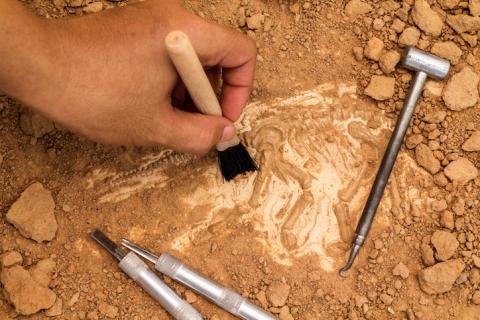What jobs can you get with an archaeology degree?
Once you graduate from an archaeology degree, the careers available to you will depend on the level of education you have completed. The two common careers for archaeologists are those based at universities and those who work at cultural resource management (CRM) companies. Many graduates will also go on to further study.
Some common careers for archaeology graduates include:
- Field technician
- Field chief
- Field supervisor
- Project archaeologist or manager
- Principal investigator
- Academic archaeologist
- Cultural resource lawyer
- Research librarian
- Museum curator
- Cultural site manager
What is archaeology?
Archaeology is the study of human history and prehistory through the excavation of sites, the analysis of artefacts and physical remains around the world.
Its subjects are past societies and cultures, ranging from the exploration of human origins and early hunter-gatherer communities to ancient environment and ancient arts and cultures.
A core part of archaeology is the dual method involving fieldwork and laboratory analysis.
As it is often studied in a joint degree with anthropology, history of art, classics, or history, archaeology degrees will often be concerned with literary evidence and the study of languages too.
The study of archaeology will therefore create a foundation in specific archaeological skills but it will also train more general skills such as critical thinking, the ability to build a logical argument, to synthesise vast amounts of information and to express ideas clearly and persuasively both in oral and written form. Many degrees will also involve the study of foreign languages.
Explore the best universities for arts and humanities degrees
What do you learn in an archaeology degree?
On an undergraduate archaeology degree, typical general modules will include topics like the archaeological method, fundamental concepts in archaeology, cultural archaeology and field and laboratory methods.
Otherwise, courses will vary based on the areas of specialisation of the faculty and institution, but most courses largely focus on ancient history. In terms of geographic area, courses can cover Egyptology, Mesopotamian archaeology, Ancient Greece and Rome, Africa, South East Asia and Ancient China.
Expect to study a language (dead or modern) related to the country or area you focus on, such as Chinese, Sanskrit, Ancient Greek, Latin or Akkadian.
More specifically, modules you may find on an archaeology degree are: Assyriology and Egyptology, Roman architecture, Aristocracy and democracy in the ancient Greek world, Mediterranean Maritime Archaeology, Etruscan Italy, Coins in Ancient Greece and Rome, Themes in African Art and Archaeology, History and Religion in India, and Arts of the Islamic World.
Archaeology work is usually assessed by coursework or essays but some schools will also evaluate your field and laboratory work.
What can you do with an architecture degree?
What can you do with a sports science degree?
What can you do with a degree in design?
What can you do with a mathematics degree?
What can you do with a medical degree?
What can you do with a veterinary science degree?
What can you do with a performing arts degree?
What can you do with an art degree?
What can you do with a business and management degree?
What can you do with an agriculture degree?
What should I study at high school if I want to study archaeology?
To study archaeology as an undergraduate you don’t need to have done specific courses at school.
It is however helpful to have done classics, geography, history, languages, sciences or social sciences.
Sciences will be a good foundation in learning about laboratory and field work methods. At the same time, humanities such as history, literature, classics, philosophy or geography will provide a good grounding in the art of essay writing.
Studying foreign languages, geography and other countries’ history will also help you better understand the complexities of exploring a different society and culture.
Social sciences will be useful in exposing you to tools needed to analyse human societies and group behaviours.
As you can see, there is a wide range of subjects that are helpful preparation for an archaeology degree, so you may want to choose the subjects you simply enjoy most.
Student experience of archaeology
Follow in Prince Charle's footsteps and study archaeology
A first year archaeology and history student from University of Oxford takes over our Twitter account
What do people who study archaeology do after graduation?
Graduates in archaeology go on to work as professional archaeologists, in museum education, curation, conservation and heritage.
The roles you would be perfect for include heritage manager, museum education or exhibitions officer, museum curator, historic buildings inspector or conservation officer, archivist, cartographer, social researcher or tourism officer.
Potential employers could be archaeological contractors or consultants, museums, university archaeology departments, national heritage agencies or local governments.
Graduates in archaeology also pursue other professions ranging from education, media, advertising and civil service to business and industry. Some graduates also do conversion degrees in law or teaching after their first degree in archaeology.
Which famous people studied archaeology?
Zahi Hawass, an Egyptian archaeologist and former Minister of State for Antiquities Affairs in Egypt studied Greek and Roman Archaeology at Alexandria University in Egypt.
Classical archaeologist Crawford Greenwalt Jr, who worked on the excavations at Sardis (the ancient city of Lydia) in contemporary Turkey, did a BA at Harvard.
Mary Leakey, the British paleoanthropologist who discovered the first fossilised Proconsul skull – an extinct ape believed to be ancestor to humans – attended lectures in archaeology at University College and at the London Museum, UK.
Both Fiona Buxton, a British local councillor, and Professor Roger Mercer OBE, Former Secretary (Chief Executive) of the Royal Commission on the Ancient and Historical Monuments of Scotland did archaeology at the University of Edinburgh in the UK.

Comments